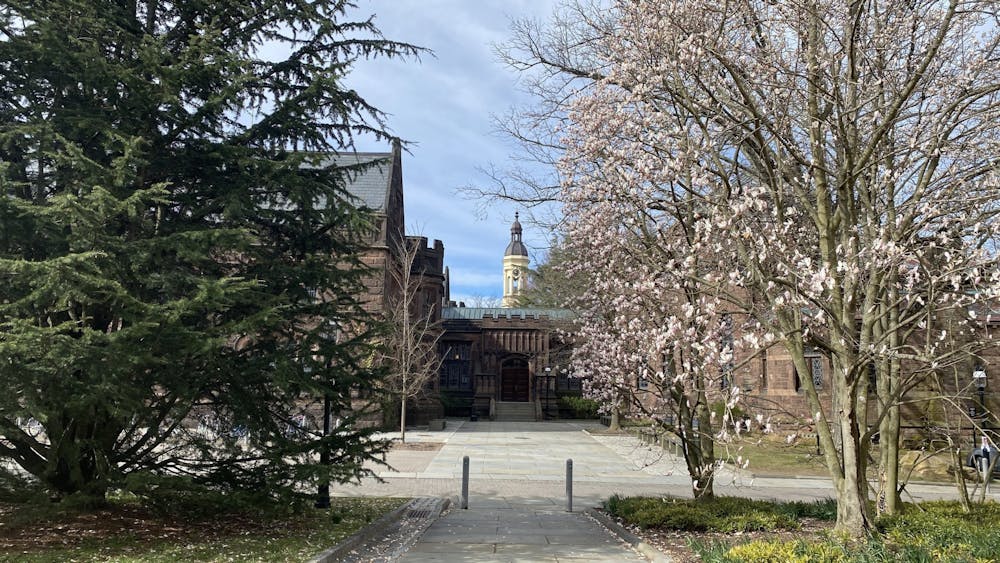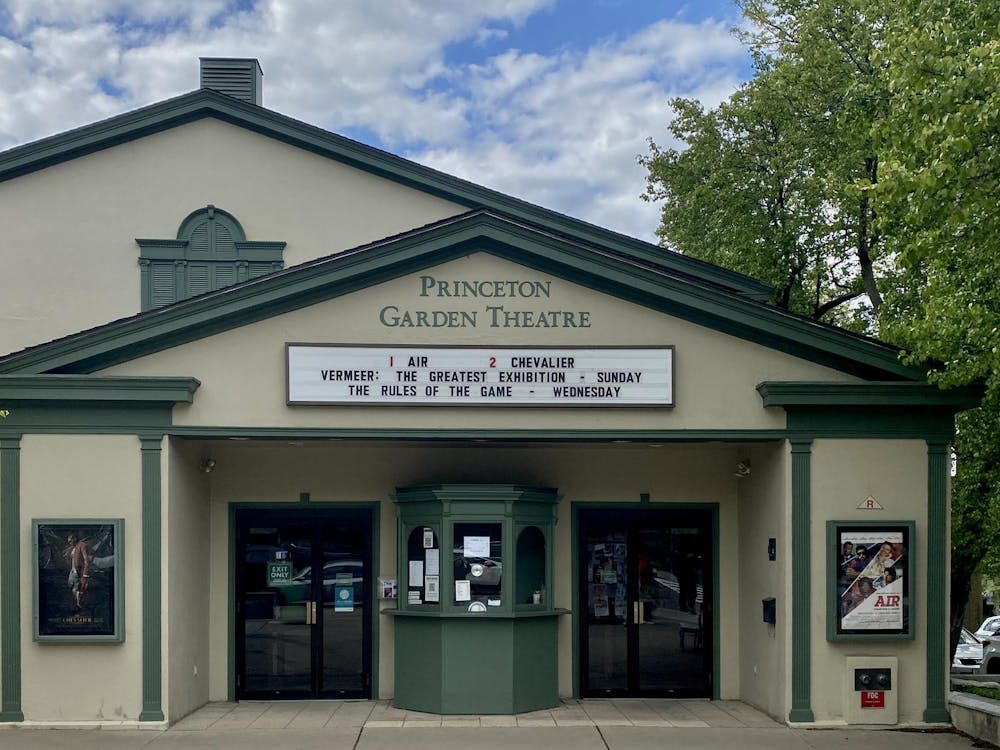Amid the ongoing conflict in Israel and Palestine, political speech has been in the spotlight on campus. University President Christopher Eisgruber ’83 spoke with “Bloomberg Markets: The Close” on Oct. 10 about protecting free speech on campus in light of the war. He referenced an orientation module that first-years complete about respecting free speech and engaging in civil dialogue.
Over the course of the 20th century, Princeton students grappled with the bounds of political speech in relation to the major events of the century. The Daily Princetonian looked back at ‘Prince’ archives to see how the campus community reacted to key historical moments of intense political speech.
World War I
In March 1917, three years after the start of the war and a month before the United States would enter the conflict, Major General Stuart Heintzelman, Dean Howard McClenahn, and University President John Grier Hibben Class of 1882 held a meeting where they agreed that academic work would come second to military drills, and that rifles would be delivered to campus within three days to begin training students.
The March 26, 1917 issue of the ‘Prince’ included an article with the subhead “In Case of War, the Military Will Take Precedence Over Studies.”
“Several men in Princeton have asked permission to hold a peace meeting, but under the present conditions no such gathering will be allowed in any of the buildings of the University,” the article read.
While the University supported the war effort, some campus community members were against the war.
In Dec. 1914, years before America would join the war, English Professor John Duncan Spaeth argued that America’s “duty and our interest [in the war] is neutrality,” and that Germany and England must “balance” each other.

One writer argued that free speech and academic freedom had become points of division since the war, and that while there has been campus discussion, there has been no “disloyalty to the government” throughout the war.
The author continued that “the dangers of free speech are greatly increased by the constant opportunities for expression of thoughts and by the high position which colleges have come to hold in national life.”
Women’s right to vote
Passed by Congress in June 1919 and ratified in August 1920, the 19th Amendment granted women the right to vote and also stirred mixed opinions on campus.

In a Feb. 1920 edition of the ‘Prince,’ a writer wrote a satirical column in response to women gaining the right to vote, that they “must not fail to take advantage of the new weapon which has almost been placed in her clutches.”
Three years after women were granted the right to vote, Edward Corwin, a professor of jurisprudence, argued that the 19th Amendment “does not represent the will of a majority of the people, but was ratified only through legislative cowardice in the presence of a determined minority brandishing a “moral issue.”” He argued that amendments should be presented directly to the people, and not just through Congress, where the amendment was ratified.
World War II
World War II made free speech a central point of discussion on campus. Letters to the editor were dominant in issues of the ‘Prince,’ including responses to the lifting of the arms embargo in November 1939, discussions of responsibility for the protection of free speech, and protests of mandated exercise.
In October 1939, during the Freshman Poll of the Class of 1943, Adolf Hitler received 93 votes in the balloting for “greatest living person.” He won the vote, beating out Albert Einstein (27 votes), Neville Chamberlain (15 votes), and Mahatma Gandhi (13 votes). A year later in 1940, the Class of 1944 again voted Hitler as the “greatest living person.”
Former ‘Prince’ editor-in-chief Robert Hazlehurst Jr. ’40 wrote a column in favor of the repeal of the arms embargo which was preventing armaments support to the allies in September 1939, to which another student — identified only as E.A.R. ’41 — responded. E.A.R. noted that “If we intend to take part in time of peace, we must do so in time of war too, and openly admit our desire to participate.”
He added, “The United States, we all agree, must attempt to keep out of a war as terrible as it is futile. Nobody wants war. Everybody wants to do the thing best designed to keep us out of war.”
Francis Broderick ’43 discussed the idea of freedom in wartime. He said “If free speech is to survive the reverses of the war, if constructive criticism is to be maintained, the responsibility for its protection lies with the government, specifically with the Attorney General’s office.”
He added that “war must impose some restriction on the extent of free speech,” and claimed that ruling in Schenck v. United States “should still guide the government's policy: ‘The question in every case is whether the words used are used in such circumstances and are of such a nature as to create a clear and present danger that they will bring about the substantive evils that Congress has a right to prevent.’ Those words must be the guiding rule of the American policy on free speech.”
One of the biggest campus-focused problems of free speech during the war was mandated exercise. A letter addressed to the ‘Prince’ was written by “a number [of students] from the Class of 1944” and argued that “the time has come to make use of that truly American commodity — free speech.”
Their argument was against the required physical exercise of students during wartime, describing it as “the Achilles heel of the Princeton War Program,” citing the academic work already placed on students and the lack of engagement with the exercises by many students.
The students said “It is completely beyond [their] comprehension that the administration should see fit to order all accelerated students to take varieties of gymnastics during these weeks when they also see fit to give us such large amounts of mental exercise.”
Women at Princeton since coeducation
In early 1969, Princeton’s Board of Trustees voted “to admit women undergraduates for a ‘better balance of social and intellectual life.’” The first female graduates of Princeton University graduated as early as 1970 — these were transfer students, originally part of the critical languages program. The first class to include women who had a four-year Princeton education was the Class of 1973.
Then-University President Robert Goheen ’40 discussed the importance of coeducation and addressed protests about women coming to campus in a ‘Prince’ special issue in 1969. He wrote that “while Princeton guarantees the right to protest, freedom of speech does not connote freedom to disrupt.”
He added that “anyone is free to speak, to demonstrate, to petition, to pass out leaflets, but not to the extent of blocking the essential business of the university or seriously infringing the rights of others.”
An event in October 1971 meant for “women faculty, students, and administrators [to] gather for dinner [as] ‘a chance to meet each other’” caused some backlash when the ‘Prince’ focused a large portion of its article on Professor Albert Sonnenfeld GS ’58 who addressed attendees at the event. Jean Taylor GS ’73 called out the ‘Prince’ for focusing the report on Sonnenfeld, writing “Your male chauvinism is really showing, ‘Prince’!”
In 1987, students sparred over heckling of the inaugural Take Back the Night event at Princeton. Robert Tsai ’94 wrote that “some men rationalize that if women are allowed to march around campus and bash men, then a few men should be allowed to lean out their windows and yell their own opinions.”
Tsai noted that “when the line between conduct blurs with free speech, problems arise that universities have found difficult to resolve.”
Gay marriage and LGBTQ+ rights
While same-sex marriage was legalized federally in June 2015, LGBTQ+ rallies had been held on campus for years before the Supreme Court decision.
In 1997, tensions rose regarding a Lesbian Gay Bisexual Alliance (LGBA) rally in October 1996. Colin Campbell ’98 “chided the LGBA,” accusing its Public Relations chair Suman Chakraborty ’97 of “suppressing free speech in the name of ‘open dialogue’” at the rally, after Ilya Shapiro ’99 publicly attacked the LGBA and their work during the event and Chakraborty asked him to leave. Mark Krumholz ’98 and Chakraborty each defended the rally, claiming the LGBA had “a right to control what happened during the rally.”
Campbell, in turn, wrote that the rally was not advertised as a “support session for homosexuals,” so during an “open mic” section of the event, there were “no disclaimers prohibiting [students] from expressing [their] views.”
Campbell clarified, “I am criticizing Mr. Chakraborty because I think he is being irrational, not because he is gay.”
Abortion
Although Roe v. Wade was only recently overturned in the Dobbs v. Jackson Women’s Health Organization opinion last year, the topic of abortion has come up in the pages of the ‘Prince’ throughout the years.
In October 2000, Justin Hastings ’01 published the column “It’s abortion, stupid” where he argued that the Democratic Party “fear[s] that Republicans will appoint conservative Supreme Court justices who will overturn Roe v. Wade. This is unlikely.”
He said that abortion is not an inherent right in the Constitution, compared to free speech and free association, which are.
“But abortion is not a fundamental right, and abortion rights advocates have been fighting a defensive battle ever since Roe to protect the flawed ruling,” he wrote.
11 years earlier, Rebecca Roberts ’92 had taken a different stance and wrote that a utopia is where all pregnancies are planned, healthy, and economically feasible, and the need to get an abortion is eliminated.
“But until that Utopia arises, the answer is clear,” she said. “The just and compassionate action is to keep abortion safe and legal.”
Victoria Davies is a News contributor for the ‘Prince.’
Lia Opperman is an associate News editor for the ‘Prince.’
Please send any corrections to corrections[at]dailyprincetonian.com.








